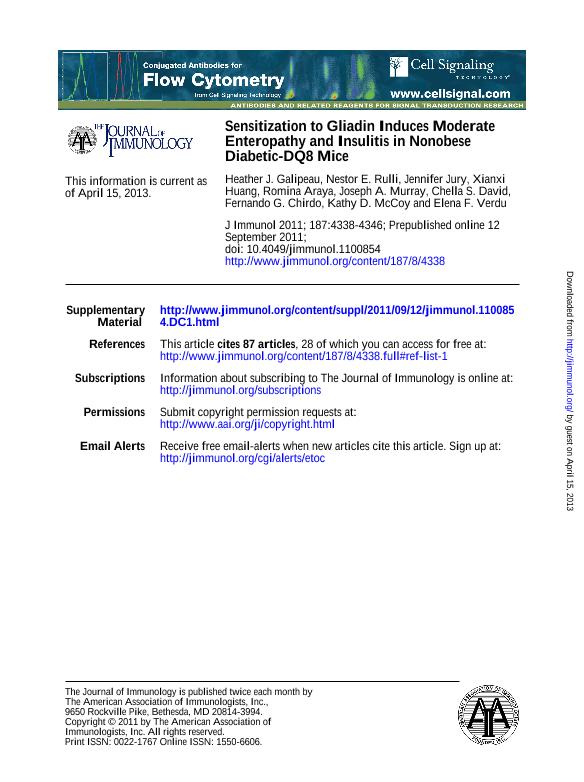Artículo
Sensitization to gliadin induces moderate enteropathy and insulitis in nonobese Diabetic-DQ8 mice
Galipeau, Heather J.; Rulli, Nestor Ezequiel ; Jury, Jennifer; Huang, Xianxi; Araya, Romina Elizabeth
; Jury, Jennifer; Huang, Xianxi; Araya, Romina Elizabeth ; Murray, Joseph A.; David, Chella S.; Chirdo, Fernando Gabriel
; Murray, Joseph A.; David, Chella S.; Chirdo, Fernando Gabriel ; McCoy, Kathy D.; Verdu, Elena F.
; McCoy, Kathy D.; Verdu, Elena F.
 ; Jury, Jennifer; Huang, Xianxi; Araya, Romina Elizabeth
; Jury, Jennifer; Huang, Xianxi; Araya, Romina Elizabeth ; Murray, Joseph A.; David, Chella S.; Chirdo, Fernando Gabriel
; Murray, Joseph A.; David, Chella S.; Chirdo, Fernando Gabriel ; McCoy, Kathy D.; Verdu, Elena F.
; McCoy, Kathy D.; Verdu, Elena F.
Fecha de publicación:
10/2011
Editorial:
American Association of Immunologists
Revista:
Journal of Immunology
ISSN:
0022-1767
Idioma:
Inglés
Tipo de recurso:
Artículo publicado
Clasificación temática:
Resumen
Celiac Disease (CD) is frequently diagnosed in patients with type 1 diabetes (T1D), and T1D patients can exhibit antibodies against tissue transglutaminase, the auto-antigen in CD. Thus, gliadin, the trigger in CD, has been suggested to play a role in T1D pathogenesis. The objective of this study was to investigate whether gliadin contributes to enteropathy and insulitis in NOD-DQ8 mice, an animal model that does not spontaneously develop T1D. Gliadin-sensitized NOD-DQ8 mice developed mucosal dysfunction, but no insulitis. Administration of anti-CD25 mAbs before sensitization induced partial depletion of CD25+Foxp3+ T-cells and led to insulitis. Mice that developed insulitis had increased pro-inflammatory cytokines in the mesenteric (MLN) and pancreatic lymph nodes (PLN). CD4+ T-cells isolated from PLN of mice that developed insulitis showed increased proliferation and proinflammatory cytokines after incubations with gliadin but not, with bovine serum albumin (BSA). In control mice, CD4+ T-cells from PLN did not proliferate in response to gliadin. In conclusion, gliadin sensitization induced moderate enteropathy in NOD-DQ8 mice but insulitis development required gliadin-sensitization and partial systemic depletion of CD25+Foxp3+ T-cells. This animal model provides a mechanistic link through which the dietary antigen gliadin, which triggers CD, modulates the onset of insulitis in the presence of partial regulatory T cell deficiency. Both innate and adaptive immune mechanisms related to gluten intolerance can be investigated in NOD-DQ8 mice.
Palabras clave:
INTESTINE
,
DIABETES
,
INNATE IMMUNITY
Archivos asociados
Licencia
Identificadores
Colecciones
Articulos(CCT - LA PLATA)
Articulos de CTRO.CIENTIFICO TECNOL.CONICET - LA PLATA
Articulos de CTRO.CIENTIFICO TECNOL.CONICET - LA PLATA
Citación
Galipeau, Heather J.; Rulli, Nestor Ezequiel; Jury, Jennifer; Huang, Xianxi; Araya, Romina Elizabeth; et al.; Sensitization to gliadin induces moderate enteropathy and insulitis in nonobese Diabetic-DQ8 mice; American Association of Immunologists; Journal of Immunology; 187; 8; 10-2011; 4338-4346
Compartir
Altmétricas



